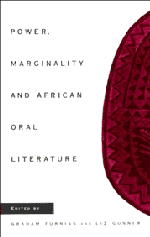Book contents
- Frontmatter
- Contents
- List of contributors
- Preface
- Note on transcription
- 1 Introduction: power, marginality and oral literature
- Part I Orality and the power of the state
- Part II Representing power relations
- Part III Oral forms and the dynamics of power
- Part IV Endorsing or subverting the paradigms: women and oral forms
- Part V Mediators and communicative strategies
- Bibliography
- Index
1 - Introduction: power, marginality and oral literature
Published online by Cambridge University Press: 18 December 2009
- Frontmatter
- Contents
- List of contributors
- Preface
- Note on transcription
- 1 Introduction: power, marginality and oral literature
- Part I Orality and the power of the state
- Part II Representing power relations
- Part III Oral forms and the dynamics of power
- Part IV Endorsing or subverting the paradigms: women and oral forms
- Part V Mediators and communicative strategies
- Bibliography
- Index
Summary
In a recent guide to anthropological research practice in relation to oral traditions and the verbal arts, Ruth Finnegan, a founder figure in the field of African oral literature, points to the interest that has developed, in anthropology as in many other fields, in local processes of negotiating meaning, the agency of artistic creativity and its relation to social action:
One theme is greater concern with individual voices, repertoire and creativity, part of the move within anthropology and other disciplines from ‘structure’ to ‘agency’. Another is an emerging interest in work on the emotions and in aesthetic and expressive facets of human activity. A more explicit focus on ‘meaning’ comes in too, both meanings to be gleaned from the ‘text’ and those expressed through a multiplicity of voices. What is involved, further, is more than just the voice of the composer/poet (in the past pictured as the central figure), but also the other participants who help to form the work and mediate its meaning and the dynamics through which this occurs.
(1992: 51)This represents a move towards an appreciation of the role that oral literature plays as a dynamic discourse about society and about the relationships between individuals, groups and classes in society.
- Type
- Chapter
- Information
- Power, Marginality and African Oral Literature , pp. 1 - 20Publisher: Cambridge University PressPrint publication year: 1995
- 3
- Cited by

